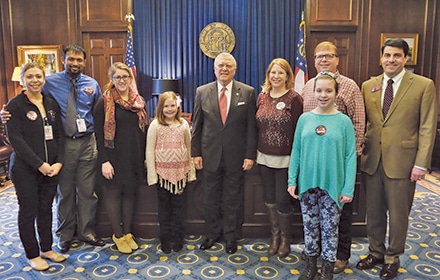
“I don’t want to freak people out, but I do want people to be aware of this illness that is so sneaky, and so fast. It nearly had me,” she states, matter-of-factly.
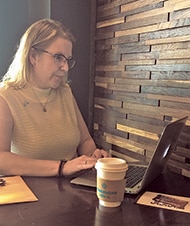
In April 2012, when she was in the midst of another, very severe bout of sickness, Thieken’s husband Paul heard his wife fall to the floor upstairs. When he reached her, she was unconscious. He called 9-1-1, and that call launched the entire family into an experience that they, nor Karen’s doctors, ever saw coming.
“A lot of it is a blur now,” Karen said, recalling bits and pieces of the ambulance ride to Gwinnett Medical Center. “I remembered an EMT yelling at me in the ambulance. Later, when I felt better, I asked if I had remembered that correctly. The guy told me that yes, he was yelling for me to breathe. He didn’t want to intubate me in the ambulance.”
When she reached the hospital Emergency Room, Karen was seen immediately by doctors. She was intubated, and doctors induced a medical coma. Karen suffered from sepsis – septic shock, specifically – as the result of an Invasive Group A strep infection which had made its way into her blood. By the time a patient reaches that stage of sepsis, there is about a 50 percent survival rate; each hour the patient goes untreated, the risk of death increases by 5 percent. Septic shock, the third and most alarming stage of sepsis, is deadly. “Within 24 hours of my arrival in the ER, doctors told my husband to call in the family and our pastor,” Thieken recalls.
“At first, they thought I had meningitis, because, in addition to all the other symptoms I had, my neck hurt so badly I was screaming in pain.” During her course of treatment, she endured dialysis (because her kidneys shut down), breathing treatments (because her lungs were shutting down) and even when she was discharged, she was barely strong enough to walk. In fact, after 11 days in Intensive care and three weeks in the hospital, she had to relearn and retrain herself to do everyday tasks that she learned as a child.
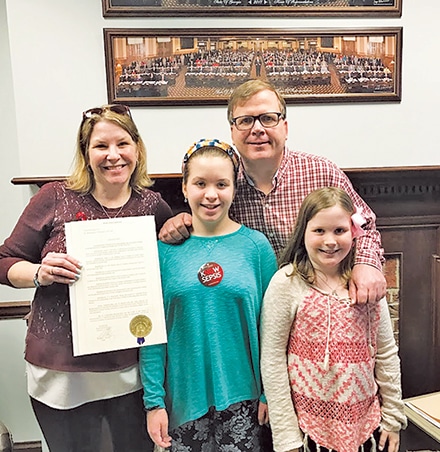
“It took me about a year to feel anywhere near my old self again, just to feel OK. About two years after my hospitalization, depression set in,” a phenomenon that today, Karen finds strange, even though depression following such a serious illness and a stint in ICU is common. “I mean, I am sitting here, a miracle. But still, I felt depressed for a while. It makes no sense, but I have learned that that’s not at all uncommon.”
On this side of the fight for her life, Karen Thieken has taken on a role that she is sure she’s meant to assume. “I have become a volunteer, a voice for sepsis sufferers and survivors in Georgia,” she explained. Earlier this year, she was at the Georgia state capitol, talking to representatives and Governor Deal about Sepsis Awareness, and her desire to see an established sepsis protocol in all Georgia hospitals. Representative Chuck Efstration assisted Thieken in her quest to meet with and educate lawmakers.
“Gwinnett Medical is the bomb. We are very lucky here in Atlanta to have such top-notch doctors and hospitals. But what about the more rural areas of the state? Gwinnett Medical knew exactly what to do, but if we established a set protocol in all hospitals, everybody touched by sepsis would have the same fighting chance,” she said.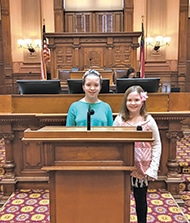
Why is awareness important? Anyone can get sepsis, from a paper cut to a sinus infection, everyone who has an infection is susceptible. And once sepsis takes hold, minutes matter. There are three stages of sepsis: sepsis, severe sepsis, and septic shock, which is both fast-moving and deadly. In short, sepsis is a condition in which the body’s aggressive response to an infection attacks organs and healthy tissue, and untreated, septic shock leads to death.
Annually, there are 1.4 million sepsis survivors in the United States alone. About 250,000 people die in the U.S. from sepsis annually, as well. The disease kills more people every year than breast cancer, prostate cancer, and AIDS combined. It is the number one killer of children in the world.
Thieken is not alone in her fight to bring awareness to people as well as healthcare providers and hospitals. “Minutes count, so why not use a screening test to eliminate sepsis when a patient presents with the symptoms?” Thieken asks. This is the question she posed to Gov. Nathan Deal and Georgia state lawmakers earlier this year. Deal responded by presenting her with a proclamation declaring the month of September Sepsis Awareness month in Georgia.
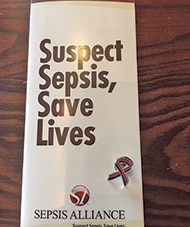
To learn more about sepsis, visit www.sepsis.org. To join Thieken’s Facebook group, search “Mission Sepsis Awareness Georgia.” To contact Thieken about sepsis awareness, or to volunteer to help educate others about the disease, email Karen@fortepromotions.com.

